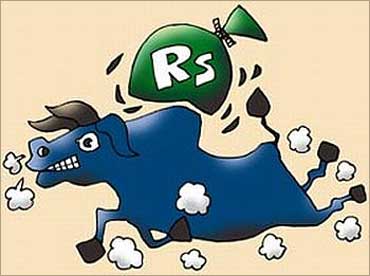 | « Back to article | Print this article |
10 money lessons to learn from 2011
As 2011 comes to an end, we take a look at crucial money lessons we learnt during difficult times of 2011. These lessons will keep you in good stead if the difficult times continue in 2012.
Indian equity markets have had a difficult time in 2011 with indices witnessing fall from 21,000 all the way to 16,000. Markets have been highly volatile during this time with US downgrade, euro crises, domestic policy paralyses, high inflation, and high interest rates leading to slowdown in economic growth adding to the uncertainty. Unpredictability is expected to rule global and domestic markets going forward in 2012.
1. Don't put all eggs in one basket
A very basic rule of investment but often ignored. Investing all your money in any one type or class of instrument is always risky, no matter what the instrument is. Make sure you evaluate your risk profile and on basis of this do adequate asset allocation. Make sure you diversify your portfolio as much as possible. It is important to know when you would need the money and have an investment plan accordingly. It is important to remember that while investing in a combination of mutual funds and stocks, avoid having exposure to the same sectors or themes.
Take exposure to gold through gold ETFs but make sure it doesn't exceed more than 10 to 15 per cent of your overall portfolio.
Courtesy: Investment-mantra.in
10 money lessons to learn from 2011
2. Always look to reduce debt
This rule holds irrespective of what economic environment persists. When interest rates are on the way upward like at present, you are forced to do a pre-payment of home loan. For instance, make sure your EMI tenure doesn't extend beyond maximum duration. Make sure you follow this thumb rule of reducing your debt. Got a bonus or an incentive? Pay off costly loans that you may have taken.
If you have multiple loans, first pay off the loans with the highest interest rate, then the one with second highest rate and so on. If you have credit card debt, personal loan and home loan, first clear off the credit card debt, then personal loan and finally home loan. For this you will have to plan out your debts and then go on following it systematically and steadily. It will not only save you money but will also give you mental peace.
3. Check your expenses and adhere to budgets
People tend to forget that good times don't last forever. If you spend lavishly during good times and continue the trend without adapting to changes in circumstances, very soon you will land in financial trouble. Hence to ensure you lead a consistent lifestyle, always draw out a budget and ensure you stick to it religiously.
If you have allocated Rs 500 per month towards your entertainment expenses, don't look to spend more than Rs 500. It will help you handle your finances better by keeping expenses well within control.
10 money lessons to learn from 2011
4. Invest in debt instruments
Make sure you always have a definite proportion of debt investments in your portfolio. Investment products such as Public Provident Fund (PPF), Employee Provident Fund (EPF) can prove to be good investments in the long run. At 8.6 per cent return and being tax-free, PPF remains very lucrative. Fixed maturity plans, debt funds, corporate FDs can also be considered for diversification.
5. Safeguard your portfolio with defensive sectors
Investing in defensive sectors such as FMCG, pharmaceuticals can offer superior returns to buy-and-hold type investors, who typically have a longer investment horizon. Focusing on sustainable dividend streams rather than simply picking the highest yielding stocks is likely to be a successful strategy for longer-term investors. In the year 2011, frontline stocks in defensive sectors have not only been successful in handling market downturn better but also have given positive returns to the investors.
10 money lessons to learn from 2011
6. Stay clear of sector funds
Sectors fund generally tend to be quite volatile since the investments are concentrating across one particular sector / theme. Make sure your understand risks involved while investing in sector fund and investing only if you are high risk investor and willing to gauge market volatilities. For instance in the year 2011, thanks to rising non-performing assets, interest rates -- banking stocks and thus banking sector funds have taken a big hit while sector funds such as these in defensives like FMCG have ruled the roost.
7. Create an emergency fund corpus
Another basic rule of financial planning but often ignored. During the time of economic crises when companies are looking to cut expenditure, reduce workforce, your job can be at stake. At this point of time, you will be forced to sell your equities since market is passing through bad times to take care of expenditure. Hence it is advisable to keep at least 3 to 6 months of your household expenses aside as emergency cash. Medical emergency or unexpected expenditure also adds to the need of maintaining an adequate emergency fund.
10 money lessons to learn from 2011
8. Don't stop your systematic investment plan (SIP) during market downturn
If you have been investing in a mutual fund (MF) scheme through a systematic investment plan (SIP), make sure you don't stop it during market downturn. Make sure you remember the basic rule of long-term investment and cost averaging in mind, and continue to invest in your SIP. It pays to keep investing in an SIP, irrespective of the market conditions. In times when the prices are subdued, you get to buy more units with the same amount of money, thus lowering your overall per unit cost.
9. Don't buy a stock just because it is available at cheap valuations
Most of retail investors tend to buy stocks just because they are available at cheap valuations. Make sure you evaluate company fundamentals, debt on the books, company management and future growth outlook before investing.
10 money lessons to learn from 2011
10. Invest in equities for the long term
Over the next decade, India is expected to do well. Make sure you make full use of this opportunity by staying invested over the long-term. Do not try and time the market. Keep investing in fundamentally good stocks in a staggered manner if you are looking at time horizon of 5+ years. Make sure you have realistic goals from your equity investments.
Market downturn gives investor adequate opportunities to rebalance your financial portfolio. In spite of a bear or a bull market, basics of investing don't change. Keep your investment strategy simple and consistent and get rich dividends over the long term.





